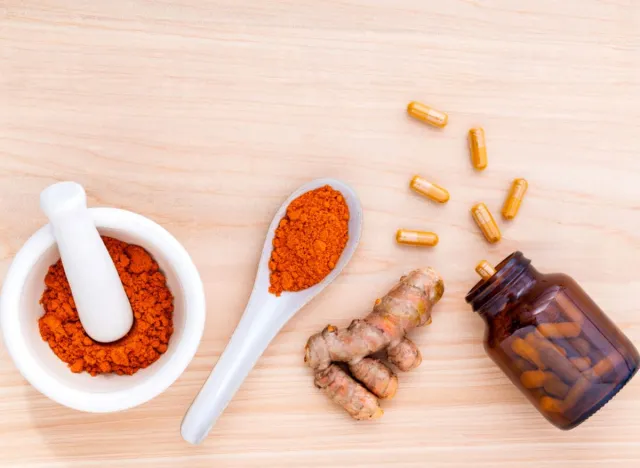Having arthritis means that you have swelling and tenderness in one or more of your joints. Receiving this diagnosis, as 58.5 million American adults have, can cause a person to feel joint pain, experience unintentional weight loss, and even have trouble moving around or performing certain tasks (like typing).
Many factors can contribute to a person's risk of developing arthritis, including one's genetic makeup, past injuries, experiencing an infection, and diet.
Regardless of the cause, for those living with chronic pain in their joints, finding ways to manage the effects of arthritis can be life-changing. While there isn't one remedy that will guarantee arthritis symptom relief, making small changes in your diet and lifestyle, including adding a supplement to your routine, may profoundly impact your pain and discomfort. One supplement you can consult your doctor about taking to manage arthritis is a turmeric supplement.
The #1 best supplement for arthritis

Supplements can be explored when searching for ways to manage arthritis symptoms. From fish oil to certain antioxidants to even collagen peptides, there are plenty of pill choices that may help your body manage arthritis a bit more effectively. But among the many supplement choices out there, the #1 choice for arthritis is a turmeric supplement.
Yellow in color and potent in flavor, turmeric has been used for centuries as both a flavorful addition to many dishes and a potent anti-inflammatory agent. The reason turmeric has been used for centuries as a remedy for many conditions is because of the curcumin compound it contains. This compound is what gives this root its anti-inflammatory properties, making it a go-to remedy for pain management, headache relief, and possibly arthritis symptom support.
Research links turmeric to targeting arthritis symptoms
According to results of a systematic review and meta-analysis of eight articles, results showed that turmeric extract at a dose of about 1,000 milligrams per day of curcumin can be used as a treatment for arthritis.
In another systematic review and meta-analysis, data showed that, after evaluating sixteen randomized controlled trials that included 1,810 adults with knee osteoarthritis, turmeric extracts significantly reduced knee pain and improved physical function compared to placebo. Too, turmeric extracts had 12% fewer adverse events than non-steroidal anti-inflammatory remedies (like Advil) and similar rates to placebo.
How to pick the best turmeric supplement
When choosing a turmeric supplement, opting for one that also contains piperine, or black pepper extract, can help increase the bioavailability of the curcumin, ultimately helping your body take the most advantage of this natural compound. And ensuring that the brand you choose is certified by third-party organizations will help ensure you are actually getting what you are paying for in those little capsules.
Other ways to manage arthritis symptoms
Besides adding a turmeric supplement to your routine, there are numerous things that people can do that may help offer some aid, including:
- Including physical activity in your life as you are able. Opt for options that are easy on joints, like walking, biking, and swimming.
- Maintaining a healthy weight
- Avoiding smoking tobacco
When it comes to food choices, leaning on certain patterns and individual foods may help people manage their arthritis symptoms as well. Generally speaking, anti-inflammatory foods are recommended for those who have this condition to help offer some relief.
Some anti-inflammatory foods that can easily be included in an arthritis-friendly diet include:
- Oily cold-water fish (like salmon)
- Walnuts
- Olive oil
- Berries
- Avocados
And along with focusing on these anti-inflammatory additions to your diet, people with arthritis can limit alcohol, excessive amounts of added sugars, and processed meats to help manage their symptoms as well.
Takeaway
Before you start taking turmeric (or any supplement for that matter), be sure to ask your health care provider if it is an appropriate choice for you. Since supplemental doses of turmeric can negatively interact with anticoagulants and diabetes-managing drugs, it is important to review your supplement plan with your personal health care provider.
Having arthritis can be challenging and uncomfortable, to say the least. But making small changes in your diet and lifestyle, including taking a turmeric supplement, may profoundly impact your pain and discomfort. As long as it is ok with your doc, why not give turmeric a shot?
No comments:
Post a Comment